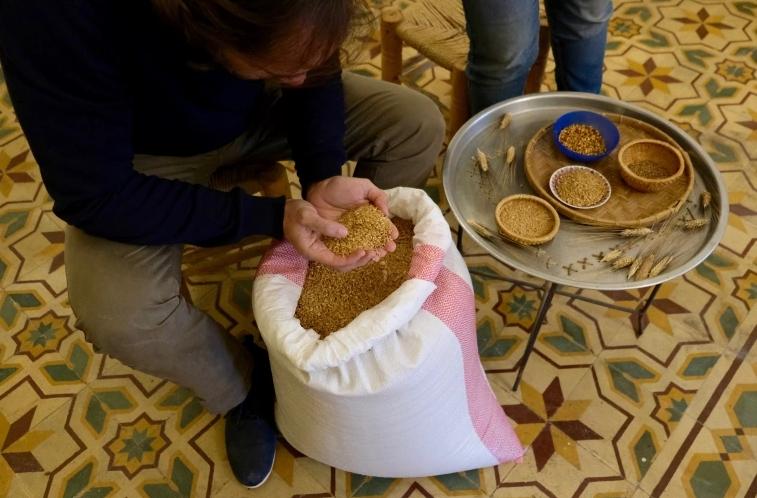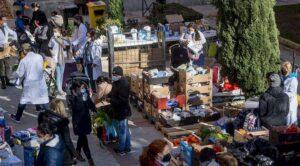An agricultural initiative contributes to food sovereignty in a country with the world’s oldest bread, turning unused urban land into productive wheat fields.
A group of Jordanians with sickles gather to harvest wheat fields around the Amman shopping mall. The logos of international supermarkets and franchises loom over the golden wheat as dozens of people harvest a crop that has been grown in the region for thousands of years.
This collective harvest last summer in the affluent west Amman area with its glittering shopping malls was part of a massive initiative to promote food sovereignty by converting unused land into wheat fields.
The project, called Al-Barakeh Wheat, which can be translated as “blessing”, began in late 2019 when founders of social enterprise Zikra for Popular Learning Lama Khatiba and Rabi Zureikat began growing wheat.
“Our first crop was harvested in the spring of 2020, at the beginning of the coronavirus pandemic,” says Zureikat. Around the same time, Jordan had one of the strictest quarantines in the world. With a total ban on travel, food was distributed by government buses and trucks.
“People stood in long queues waiting for bread to be distributed,” says Zureikat. “We harvested wheat and started baking bread at home. We felt the ability to rely on ourselves was powerful, it was an amazing feeling.”
After successfully growing a tonne and a half of wheat, Zureikat and Khatib began finding vacant land in Amman and mobilising others to join their efforts to reclaim Jordan’s wheat fields and encourage Jordanians to grow their own food.
Since their first harvest in 2020, hundreds of people have joined a collective farming initiative that teaches participants how to grow wheat throughout the season and sustain themselves with wheat throughout the year.
Disappearing wheat fields
Jordan is part of the Fertile Crescent, the region where wheat was domesticated. In the north-east of the country, archaeologists have found the world’s oldest loaf of bread, a loaf baked 14,400 years ago.
The durum wheat grown in Jordan dates back to the birth of agriculture. For millennia, the region has been a major producer of rain-fed wheat, the main source of food for the population. But today Jordan imports more than 97 per cent of its grain.
In the 1960s, wheat was still a major crop in Jordan, and its production was large enough to export. With intensive urbanisation invading farmland, concrete blocks replaced wheat fields for decades. Population growth increased wheat consumption, but production levels fell.
American wheat began to flood local markets in the 1970s. The adoption of policies to liberalise markets and remove subsidies for local production made it increasingly difficult for local farmers to compete with cheaper imported wheat.
“Because of free trade agreements and structural adjustment programmes by international financial institutions, [Jordan] couldn’t subsidize local farmers,” says Razan Zuaither, president of the Arab Network for Food Sovereignty, a civil society group that promotes sustainable food systems. and confidence in the Arab region.
With a background in landscape architecture and agricultural engineering, Zouaiter and her partner Hassan al-Jaja’a wanted to grow wheat in Jordan in the 1980s. “But we knew it was a losing battle to compete with American wheat, which was much cheaper than growing local wheat,” says Zuaiter.
To keep bread prices low, the Jordanian government subsidised imports of white flour. In the absence of policies to protect local wheat cultivation, many farmers have switched to growing more profitable fruits and vegetables.
With the flow of cheaper imported wheat and the urbanisation of fertile farmland, the country with the world’s oldest bread began importing most of its wheat .
For Zuaiter, Jordan’s dependence on imports is a political problem with dire consequences for the country’s stability and independence. “Food sovereignty should not be viewed only in terms of profit,” she says. “Food production should be seen as a national priority and a local security issue.”
Supply chain disruptions due to the COVID-19 pandemic have highlighted the problems of lack of food sovereignty. As Jordan imports most of its staple foods, it is particularly vulnerable to disruption.
A recent report published by the Carnegie Endowment for International Peace found that 53 per cent of Jordanians suffer from food insecurity .
The return of local wheat
For Barake’s founders, growing wheat on neglected plots of land is a way to regain independence and strengthen sovereignty in a country that depends heavily on food imports and foreign aid.
Last September, in partnership with wheat farmers and a local bakery, the project also began selling bread made from 100 per cent local wheat, previously almost impossible to find in markets.
Since only imported white flour is subsidised, local whole wheat bread is more expensive. But according to Zureikat, despite the increased cost, demand has been high, with at least 700 sacks of local bread being sold every day.
“Even if it costs more, the initiative has great value,” he says. “It changes the way people think about their land and food and brings people from different walks of life together.”
The project also aims to revive ancient traditions and rekindle interest in local agriculture. Inviting experienced wheat farmers to teach city dwellers how to grow their own food disrupts class relations, as undervalued and marginalised farmers take on the role of teachers while wealthier Amman residents become their apprentices.
“By planting our own wheat, this initiative gives us an opportunity to reconnect with the land and the food we eat,” says Dima Masri, a researcher who joined the wheat cultivation this year to explore local wisdom and ancestral traditions.
“Being part of nature.”
Attracted by the values of the sovereignty and independence project, Masri took part in the wheat planting last month. The highlight, she said, was a group recitation of the prayer of ancient farmers, which celebrated the cultivation of wheat as a way to feed not only people but also birds and ants and to be alone with nature.
“Praying is about being part of the community, part of nature,” says Zureikat. “When we grow food, we think about our neighbours as well as the animals around us. We are part of the whole, we are not thinking about individual gain or profit.”
He says the project is inspired by the concept of barakeh, “blessing”, a value system based on sharing and cooperation, which was lost with the disappearance of wheat fields and collective farming, which used to be the backbone of Jordanian society.
“During one of the wheat planting sessions, a farmer told us that birds sometimes fly in to eat the wheat. So one of the participants, a townsman, said he would make a scarecrow.
But the farmer said no. He said the bird was entitled to get some of the seeds. “It’s a barake,” explains Zureikat, slipping extra seeds for the birds.
“It’s about being part of a community, sharing resources, not competing with others.”



